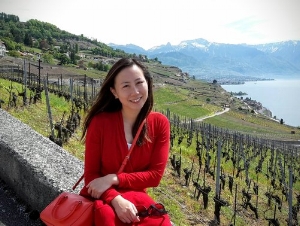Poetry and Politics with Yun Wei
/Yun Wei received her M.F.A in Poetry from Brooklyn College and a Bachelor’s in International Relations from Georgetown University. Her writing awards include the Geneva Literary Prizes for Fiction and Poetry, the Himan Brown Poetry Fellowship and the Ray Bradbury Youth Short Story Award. Her work is forthcoming from Brooklyn Poets’ Anthology and has appeared in Apt Magazine, Word Riot, The Brooklyn Review and other journals. For the last few years, she has been working on global health development in Switzerland, where chocolate and mulled wine were her daily diet.
Content Editor Hannah Gardner speaks with Yun Wei about her poem "Second Child" below.
“Second Child” was inspired by China’s decision to implement a two-child policy in place of the one-child policy that has been in effect since the 1980s. What are the benefits of using poetry as political and social commentary?
Politics and poetry share a common obsession with language, but there’s a general perception that politics’ language has impact while poetry is passive or removed from immediate realities. Some of my favorite poets like Adrienne Rich and Sharon Olds have shattered that misconception in exquisite fashion. Poetry has the ability to enact the change that politics promise, sometimes even more powerfully because it disrupts your biases, charges up your emotions, and integrates into the chemistry of your thoughts.
In “Second Child,” poetry felt like the only vehicle for me to talk about China’s population control policies because of the universal and individual impact. This has changed every family’s shaping of their future, daily lives and women’s decisions about their bodies. I still don’t know if I’ve really captured the magnitude and specificity of it but I had to try.
One of the images that stuck with me in “Second Child” is the use of nature and, specifically, water. For instance, the child is referred to as “a body of water on fire.” How easily do such images come to you, and where did this one come from?
I have no idea how my brain works! Other than that it’s overactive and I should probably meditate more. When I close my eyes, I never get blank darkness, the inside of my eyelids are constantly filled with random, nonsensical images. Looking back, this image probably sprung up since I was imagining the Second Child’s body as a changing landscape in a theoretical place (without the one-child policy) where the rules of our world don’t apply.
The last stanza is very powerful, particularly the last line. How do you know when a poem is finished? Do you write with a specific ending in mind?
Sticking the landing is always the hardest. It never works for me when trying to force a preconceived ending, especially in poetry as opposed to fiction. I usually write a dozen last lines before finding the right one. Sometimes it comes in a few hours, sometimes a few months. It’s the last decision you have to make so very nerve-wracking.
You have travelled many places, including Iceland, Peru, and Ireland. To what extend does travel play a role in your writing?
Whenever my soul is feeling parched, a rental car or plane ticket always replenishes me. The unfamiliar culture, food, language, landscape make a healthy shock, and afterwards, I find that whatever knots my mind has gotten itself into get undone, and the threads are open, reaching out for new ideas.
Sometimes my travels turn into settings in my writing (like my story with Apt Magazine set in Iceland, “The Sudden”), but a lot of the time, I feel overwhelmed by those stunning places that I’m afraid my writing won’t do it justice or it’ll have to feature as almost its own character. A lot of traveling also means less time to write though I try to scribble down notes in whatever mode of transportation I’m in, like the time we were caught driving through a hurricane in Iceland and I took notes on my cell phone while hoping for survival.
Do you remember when you started writing? What drove you to continue and what drives you now?
I started writing as a child when I first moved from China to Montreal. Writing stories and poems was a way for me to sort through the absolute mess of trying to learn French, English, Mandarin and Spanish at the same time. Writing has been a constant presence in my life, it feels natural to spend a few hours with it every day, like my usual glass of milk as a kid before going to bed. It’s a necessity, an addiction, an impulse. Plus I’d like to think it strengthens my bones.
What writers have influenced you over the years?
I’ve already mentioned Adrienne Rich who I go back to again and again. Other obsessions include Stephen Dunn, Federico Garcia Lorca, Marianne Moore. Lately I’ve been reading Ocean Vuong and Brenda Shaughnessy, always reminding myself I still have a long way to go with my poetry.
What are you currently working on?
I’m drafting my first novel about a Chinese-American family where the daughter starts uncovering forgotten elements in her past. I’m trying to develop a theory about how individual, collective, manipulated memory can manifest and affect the present. Writing it, I alternate between cliff-side terror and peak excitement on a daily basis. Actually, mostly just terror.
Enjoy Yun reading her work here.

